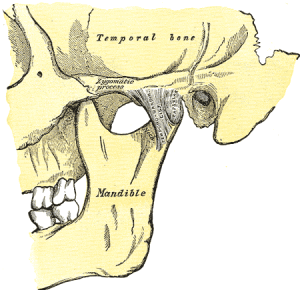 Commonly known as TMJ, temporomandibular joint pain affects over 10 million Americans and can involve difficulty chewing, jaw muscle stiffness and painful popping or clicking, according to the National Institute of Dental and Craniofacial Research.
Commonly known as TMJ, temporomandibular joint pain affects over 10 million Americans and can involve difficulty chewing, jaw muscle stiffness and painful popping or clicking, according to the National Institute of Dental and Craniofacial Research.
Although for some people the pain of TMJ goes away on its own, others develop long-term problems and need treatment to help their pain.
Here are five tips you can practice at home to help your TMJ symptoms.
Jaw Exercises
- Try opening your mouth as wide as you can without feeling pain, move your jaw to the right and hold for 10 seconds, do the same to the left and repeat five times.
- Massage the muscles around your jaw hinge in a downward motion.
Relaxation
Stress and anxiety are very common inducers of TMJ. Some people tend to clench their jaw when feeling stressed or anxious, which results in TMJ symptoms.
- Practice deep breathing. The best way to do this is to lie on your back, place your left hand on your stomach and right hand on your chest. Count to five to inhale, hold your inhale for two seconds, and exhale for five seconds.
- Stretch your spine. Interlock your hands behind your head and bend forward with straight legs so that your head is reaching for the floor. Stay in this position for at least ten seconds accompanied with awareness to breathing. This practice can deeply stretch and relax your spinal chord and reduce TMJ pain.
Vitamins and Minerals
Deficiencies in calcium and magnesium are found to be common in people suffering from TMJ. The International Dental Association conducted a study on 50 TMJ sufferers who added calcium and magnesium supplements to their routine and found pain relief in 70 percent of the participants.
- Magnesium rich food: Cashews, avocados, almonds soybeans, sesame butter, spinach, squash, sunflower seeds, rice, flaxseed.
- Calcium rich food: milk, banana, almond, spinach, coconut, yogurt.
Herbal Remedies
- Rhus Toxicodendron: This herb can help relieve jaw stiffness.
- Kava Root: If your TMJ is due to stress or anxiety, Kava can be used to calm your nervous system and in turn, reduce TMJ symptoms caused by anxiety like a stiff jaw.
- Magnesia Phosphorica: This homeopathic remedy can ease muscle stiffness and has an antispasmodic effect.
Acupuncture
Acupuncture has proven to be effective in treating TMJ in a number of ways. In Traditional Chinese Medicine, TMJ often represents an imbalance in the liver and gallbladder meridians which traverse the areas usually associated with TMJ pain. Acupuncture points focused on these areas can stimulate the healing process, and return the meridians and the body back to balance, improving your TMJ symptoms.
Sources:
http://umm.edu/health/medical/altmed/condition/temporomandibular-joint-dysfunction
http://home-cure.net/home-remedies-exercises-natural-cures-tmj-treatment/